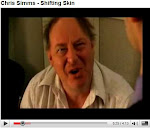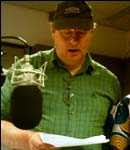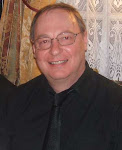This story orignally appeared in Chorley and District Writing Circle's magazine Aware (issue 4, December 2008) where it was a prize-winning entrant in Aware's competition, themed around, "Flight." A jolly good reason to go a buy a copy too!
Otto stood at the edge of the high ground, the point at which it fell away most steeply, and felt the stiff breeze tug at his neatly cropped hair and beard.
"Are you sure you want to do this?" Charles asked, in his head.
"Please don’t," said Miyoko, her voice catching in her throat.
"I have to," Otto murmured. "There is no other way."
"You realise how this is likely gonna end up?" said Wilbur, concerned.
"I promise you," said Otto, "I have keine sorge – no fear."
"Well…" said Wilbur, "it’s your neck."
"Not just yours," Charles murmured.
"It has been a pleasure to meet you, gentlemen, madam. But now, I must fly."
With that, Otto turned, broke into a run, hurled himself off the edge of the mound and into space.
The crowd below, men in frock-coats, ladies in their Sunday-best dresses, gasped.
The bat-winged-like structure of wires and fabric around Otto stretched and groaned as the updraft of air lifted him high over the heads of the people watching. His control of the craft was now well-practised; he could, if the wind was right, hover in the air. Adjusting himself against the triangular control frame, he called down to a figure amongst the spectators beneath him. "Make one of your pictures, Herr Anschütz!"
"I will! I do!" cried out Anschütz, from behind his apparatus, mounted on a tripod.
As Otto alighted on the ground, Wilbur and Orville ran to join him. "That was mighty swell. Whaddya call this thing?" Otto Lilienthal did not speak English, but his brother, Gustav, helping Otto out of the glider, answered in English tinged with both a German and Australian accent, "We call it the ‘Derwitzer.’ Derwitz is where first we made it."
"We read translations of your articles, back in Ohio. But to see it in action – well… that’s something else!"
Otto beamed with pleasure. He may not have understood what the two Americans had said, but their excitement was obvious. "It is a delightful distraction, to fly like a bird." Gustav translated.
"Hey, more than a distraction," said Orville. "It’s been man’s dream to fly like a bird down through the ages! We’ve been trying to solve the flying problem for years now."
"Yeah, we’ve made lotsa machines to test ideas," said Wilbur.
Otto listened to the translation before replying. "To invent an airplane is nothing. To build one is something. But to fly is everything."
"Maybe not the best thing," said Charles’ voice.
"What harm could there possibly be to fly like a bird?" Otto thought to himself.
"You have no idea," Charles Sweeney answered.
"No idea at all," Miyoko sobbed. "Not unless you become a hibakusha."
"So," said Orville, "how do you control the – whaddya call it? – the Derwitzer?"
"Ah, yes, gentlemen," Gustav answered. "My brother simply changes the centre of gravity by the slightest shift in his weight. That controls the direction in which the glider travels."
"The slightest shift?" said Wilbur. "Can just a slight alteration make such a big difference?"
"Believe me," Miyoko fought to bring her voice under control. "The tiniest things can have the biggest consequences."
"Ain’t that the truth," said Charles Sweeney. But only Otto, in his head, heard them. Gustav translated what Orville and Wilbur had said for his brother. Otto replied, "It is sufficient. I have made almost two thousand flights now, some as far as fifty metres."
"But what if you had an engine?" Wouldn’t you need some kinda control surfaces? And what about going further? And picking when and how you land?"
"It is true, the glider does not manoeuvre as would a bird. There is a tendency to pitch down, from which it is difficult to recover."
"But we are working on it," Gustav added, "and also are we working on an engine."
"Then we will be able to fly wherever we may wish, whenever we wish, for whatever purpose we wish. We will be as free as the birds."
"Not all of us will be free," Miyoko whispered.
"Come and see me fly again tomorrow," said Otto.
"Gee, I dunno," said Orville Wright. "Me and my brother have found you a great inspiration, Herr Lilienthal."
"But I think we wanna look at some other ways of doing things. We wanna powered machine," Wilbur added.
The next day, August 9th, 1896, as Otto Lilienthal took off in his glider from the great artificial hill he and his bother had constructed outside Berlin, he imagined the two American brothers were still there with him. Suddenly, the glider pitched forward. Otto struggled in vain to regain control, but smashed into the ground. His spine was broken. In his final hours, the voices he had been hearing in his head returned. With one final effort, he said to the Americans, "Kleine Opfer müssen gebracht werden."
"What?" said Wilbur. "What did he say?"
"‘Small sacrifices must be made.’"
Otto Lilienthal died next day aged 48.
Exactly 49 years later, the span of a man’s lifetime, on August 9th 1945, Major Charles W. Sweeney banked the B29 Superfortress as sharply as he could and at full throttle to get away from the bomb his airplane had just released over the Japanese city of Nagasaki. Forty-three seconds later it exploded, killing seventy thousand people.
One of the survivors, one of the "explosion-affected people," or Hibakusha, as they were known, Miyoko Matsubara, imagined herself talking with Otto Lilienthal. Talking, asking, pleading with him not to develop a flying machine. But all she could hear him say were his final words.
Small sacrifices must be made.
The End
.jpg)






No comments:
Post a Comment